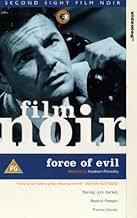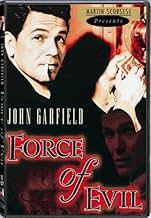Joe Morse, un jeune avocat, devient conseiller d'un gang contrôlant les paris. Confronté à son frère, qui refuse d'entrer dans sa combine et amoureux d'une fille de la bande, il finit par se... Tout lireJoe Morse, un jeune avocat, devient conseiller d'un gang contrôlant les paris. Confronté à son frère, qui refuse d'entrer dans sa combine et amoureux d'une fille de la bande, il finit par se révolter et s'attaque à l'organisation.Joe Morse, un jeune avocat, devient conseiller d'un gang contrôlant les paris. Confronté à son frère, qui refuse d'entrer dans sa combine et amoureux d'une fille de la bande, il finit par se révolter et s'attaque à l'organisation.
- Réalisation
- Scénario
- Casting principal
- Récompenses
- 4 victoires au total
- Freddie Bauer
- (as Howland Chamberlin)
- Comptroller
- (non crédité)
- Sorter
- (non crédité)
- Sylvia Morse
- (non crédité)
- Sorter
- (non crédité)
- Detective
- (non crédité)
- Mother
- (non crédité)
- Attorney
- (non crédité)
Avis à la une
The relationship is a tragic one. Thomas Gomez must be one of the most underrated actors of his day. He steals every scene he's in with the quick-talking Garfield, who was so good in THE POSTMAN ALWAYS RINGS TWICE. This may be familiar to fans of RAGING BULL, where both sets of brothers in two very different films love each other, but have a difficult time displaying affection.
Two fabulous scenes stand out and would be impossible if shot in color. The first occurs when Garfield stumbles upon a darkened office with his door slightly ajar. The light from his office cuts through the middle of the screen, allowing Garfield to snoop. Another is the shootout at the film's climax, where all of the three shooters are lying in the shadows, creating suspense based on what we cannot see. It is all done in a very impressionistic way, a superb use of lighting and shadow. This is black and white at its best. Pure and evil. A truly great film. I would stay focused on the scenes between Gomez and Garfield. This sad brotherhood plays incredibly against a brilliant backdrop of crime and double-crossing.
FORCE OF EVIL is another reminder of how good Hollywood films of the 1940's were. Without them, we probably would not have the classics of the past 25 years.
The problem is, Joe's older brother Leo (Thomas Gomez) runs one of those smaller booking outfits. He is 50 with heart trouble and Joe figures that loosing his business like this will finish him off. Joe wants to tell Leo outright what is going on so he won't take bets for the 4th of July, but is ordered in no uncertain terms by the head of the syndicate to not tell his brother anything.
It's at this point the film loses its way. I can't tell you WHY anybody does anything from this point forward. For example, Joe tells the cops to raid his brother's bookie joint supposedly to get him to not take bets for the 4th of July, but his brother still gets out of jail before the 4th of July and ends up taking bets for the 4th and going broke anyways. What was the point? Joe takes an outsized romantic interest in a young girl working in his brother's gambling joint - Beatrice Pearson as Doris - even though it is obvious she is not remotely interested in him unless he reforms, and he is not the least bit interested in reforming.
I rated this as above average because of the great noirish photography, good dialogue, and fine acting. It is just too bad it was not in service to a more coherent plot.
Of course the fact that the film was shot totally on location in scintillating black and white noir in New York City, gave it a dimension that no other noir films have, save possibly Night and the City which was also shot on location in London.
John Garfield who was as quintessential a New Yorker as you could get plays Joe Morse, smooth lawyer for a big time racketeer Roy Roberts who is looking to either take over or muscle out the small time policy banks in the numbers racket. One of those banks is owned by Garfield's brother, Thomas Gomez.
Garfield is as ruthless as Roberts, but with a velvet glove. He tries to get Gomez to go along with the syndicate, but Gomez balks. There's also a prosecutor looking into the numbers racket and a tapped phone which figures prominently in the climax.
Given the leftwing polemics of both the star and director Abraham Polonsky, Force of Evil got the attention of the ultra rightwing House Un American Activities Committee. Polonsky was blacklisted for over 20 years and Garfield died under the strain of the investigation.
Given what has happened to the Soviet Union, I wonder if Garfield and Polonsky were alive today what they would say and how they would feel about their work here. It's interesting to speculate.
But as entertainment Force of Evil is a great success and that is the first rule of film. Also look for a good performance by Marie Windsor as Roberts's wife with a yen for Garfield. One of her first femme fatale roles and one of her best.
Sermon over: none of the above gets in the way of a raging, doom-laden crime melo that, like a snowball, gets faster and weightier as it barrels along. Superb New York location photography, a vitriolic script, and committed, sincere performances lock our attention to every second of its 81 New York minutes. If it weren't for Gun Crazy (scripted under a front name by another dangerous pinko, Dalton Trumbo), Force of Evil would be the best film noir ever made.
But a few differences help cast a light on what this is:
- the protagonist is not a gumshoe unraveling a case or hapless schmuck crushed by the fates. He's a cocky narrator, as much in control of what happens as anyone else, and in on it from the start. He has the usual fast-talking bravado, he glides smoothly, sweeps the girl off her feet. And yet his real impetus is wanting to pay back a big brother who sacrificed to get him out of tenement life.
- the girl is not some world-savvy dame but a sweet, innocent soul who instinctively backs out of the racket when it starts to feel wrong and is ready to fall for him only tentatively, guarding herself as she gives way.
All through this New York looks gritty rather than sultry, the narrative light is harsh and anxious. The contrast is between not entirely legal but not entirely immoral slum life, and the new cut-throat world of big business coming for the little guy. It's a bit of stretch to show the smalltime hustlers as the personable 'good guys' but that's the short-hand used. Its real progenitors are gangster films.
- And third, there is a scheme underway that resolves all this, to turn a numbers racket run piecemeal from tenement backrooms into a respectable, lucrative business run from Wall Street.
There's a lot of talk throughout, in that rat-tat-tat fashion of Hollywood. The dialogue verges on histrionic, and the whole has a verbose feel, but one that feels like someone has studied this life and is trying to come back with an honest depiction. It has a thickness of world to it, although the mannerisms are obvious.
Here's the cinch and what probably earned the movie a reputation as left-wing and landed the filmmaker in the famous HUAC blacklist.
The scheme works, the older brother eventually goes along with it, who had earlier made a big moral stand against it. The girl is swept off her feet. Our guy stands to make a fortune, help his brother, and get the girl who is not a dame like his boss's wife.
Except, in unchecked capitalism no one is really in control. Police had been watching but it's the nerve-wracked bookkeeper who sets the scene for grievous consequences to follow. The moral resolution is that it works but at what price to the soul; the lesson remains that a life of scheming doesn't pay and I'm not bowled over in this case.
Even more pertinently however, were the smalltime hustlers a boon to their community? They were running much the same lottery, working peoples' money for the promise that maybe this week it'll be you. But it seems there were bonds of community which the merger frays and disturbs. You'll see that it's our hero's tie to a human story rooted in community that really foils the plan.
The evocative finale with the couple descending stairs with the Brooklyn Bridge hulking above them is a favorite. In fact my favorite bits here all revolve around these two and their unlikely bond, their playful interplay against the larger background.
Le saviez-vous
- AnecdotesIn order to show cinematographer George Barnes how he wanted the film to look, Abraham Polonsky gave him a book of Edward Hopper's Third Avenue paintings.
- GaffesDuring a climactic montage set at an East Coast racetrack on the Fourth of July, people in the stock footage crowd scenes are dressed in winter garments nobody would wear in the middle of summer.
- Citations
[after Joe bails his brother, Doris and the others out of jail]
Doris Lowry: You know I've got my whole life to think about now and you won't be of any help.
Joe Morse: How do you know? You know everything I touch turns to gold. It's raining out and I promised my brother to take you home.
Doris Lowry: Well, that's a lie.
Joe Morse: Well, it's not true; but I would have had he asked. You know you can't tell about your life 'til you're all through living it. Come on, I'll give you a lift. You're tired, I'm tireder. What can happen to either one of us? You tell me the story of your life and maybe I can suggest a happy ending.
- Versions alternativesAll existing copies of the film are of the version that was cut by 10 minutes in order to fit into a double bill.
- ConnexionsEdited into American Cinema: Film Noir (1995)
Meilleurs choix
- How long is Force of Evil?Alimenté par Alexa
Détails
Box-office
- Montant brut aux États-Unis et au Canada
- 948 000 $US
- Montant brut mondial
- 1 165 000 $US
- Durée
- 1h 19min(79 min)
- Couleur
- Rapport de forme
- 1.33 : 1

























